Transferts monétaires et mobilité humaine
Les transferts monétaires sont souvent utilisés lors de crises afin de répondre aux besoins des personnes migrantes. Dans cette page, vous trouverez des ressources sur les transferts monétaires et la migration.

La Croix-Rouge se prépare à fournir une aide humanitaire aux migrant·es de la caravane sur le point de quitter le Honduras pour le Guatemala.
©Johannes Chinchilla / FICR.
Conflits, crises économiques et catastrophes sont autant de raisons ayant contraint des personnes à fuir et à traverser des frontières dans des conditions éprouvantes et risquées, en quête de sécurité et de moyens de subsistance. En 2020, le nombre de personnes déplacées de force s’est envolé au niveau sans précédent de plus de 80 millions de personnes, soit près du double du nombre enregistré il y a une dizaine d’année. Cette tendance s’aggrave et les effets du changement climatique menacent de déplacer jusqu’à 200 millions de personnes d’ici 2050.
L’assistance monétaire est de plus en plus utilisée afin de répondre aux besoins des personnes en situation de déplacement. On y a eu recours à grande échelle dans différents contextes de migration, en Europe en 2015 jusqu’au Venezuela pour « los caminantes ». Elle a également été utilisée dans d’autres crises migratoires, notamment en Amérique centrale, au Sahel, en Méditerranée et dans la Corne de l’Afrique. L’assistance monétaire est à l’heure actuelle l’une des principales formes d’aide apportée aux populations déplacées en Ukraine et dans les pays voisins.
Il existe une myriade de perspectives et de définitions concernant le mot « migrant·e » et la façon dont les humanitaires doivent agir. C’est pourquoi nous ne choisissons pas une définition unique pour le moment, étant donné que les discussions sur l’assistance monétaire et la migration en sont encore à leurs prémices et que le langage évolue encore.
Documenter et partager les données probantes donnera lieu à des interventions plus efficaces. Cette page contient une sélection de ressources utiles concernant la migration et le recours à l’assistance monétaire. Elle sera mise à jour au fil des discussions ayant lieu dans les espaces humanitaires des transferts monétaires.
Priorités actuelles
Afin de contribuer aux progrès relatifs à cet enjeu, nous nous engageons à :
- soutenir la création de données probantes aux niveaux régional et mondial ;
- contribuer aux solutions pratiques visant à mettre en œuvre les transferts monétaires auprès des personnes migrantes ;
- organiser des discussions sur les enjeux majeurs basées sur des données probantes.
Contenu récent
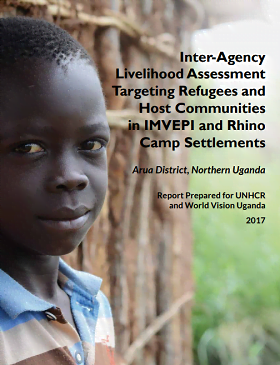
Inter-Agency Livelihood Assessment Targeting Refugees and Host Communities in IMVEPI and Rhino Camp Settlements Arua District, Northern Uganda
Case Study
This inter-agency needs assessment by World Vision Uganda (WVU), UNHCR and Caritas was conducted in two settlement areas of Rhino and Imvepi located in the West Nile Region of Uganda. The Imvepi settlement is the most recently opened area (February 2017) for resettlement and located about 72km east of the...
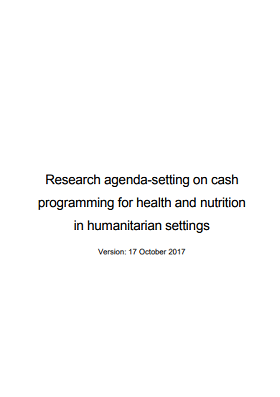
Research agenda-setting on cash programming for health and nutrition in humanitarian settings
Report
While the evidence base for cash transfer programming (CTP) in humanitarian contexts is more established for food security, it is very limited for health. The aim of this study was to develop a research agenda on CTP for health and nutrition in humanitarian settings.
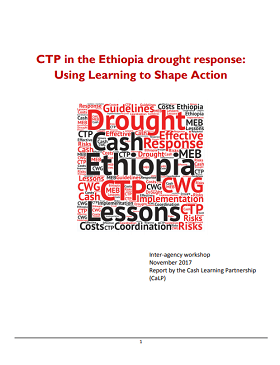
CTP in the Ethiopia Drought Response: Using Learning to Shape Action
Report
This workshop, convened by the CALP Network and the Ethiopia Cash Working Group, reflected on the use of cash transfers in the 2017 drought response. Key findings were: Cash helped address immediate needs and contributed to meeting some of the drought response objectives. There were significant...
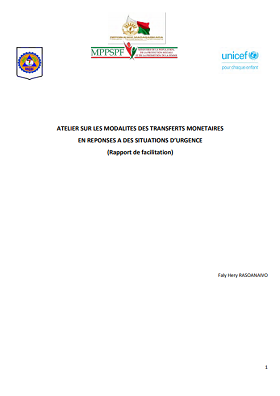
Atelier sur les Modalites des Transferts Monetaires en Reponses a des Situations D’urgence (Rapport de facilitation)
Rapport
During the past last two years, partners in Madagascar have been supporting 13 different type of cash programs and have targeted about 1.2 million people. This multi-partner approach has created challenges for technical and institutional coordination. An emergency cash group was formed in 2016 under the...

Response Option Analysis for Jere, Konduga and MMC (Borno), Inter-sector Workshop
Guidelines and Tools
In March 2017, the Consortium began the pilot in Nigeria with the aim of providing technical and strategic support to country-based humanitarian organisations, enabling them to engage in collaborative assessments and decision making. Whilst the Consortium has not been conceived to provide direct...
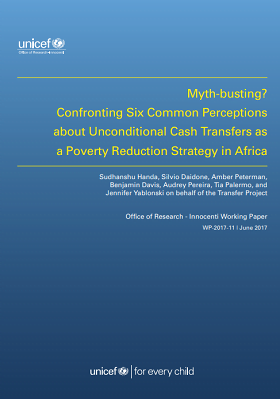
Myth-busting? Confronting Six Common Perceptions about Unconditional Cash Transfers as a Poverty Reduction Strategy in Africa
Report
This paper summarizes evidence on six perceptions associated with cash transfer programming, using eight rigorous evaluations conducted on large-scale government unconditional cash transfers in sub-Saharan Africa, under the Transfer Project. Specifically, it investigates if transfers: 1)...

A buffer against the drought
Report
The Government of Kenya in partnership with DFID undertake a long term social protection program(Hunger Safety Net Program) in Northern Kenya reaching out to poor households with bi monthly cash transfers. So much investment has been put in this program including pre-registration and carding of...
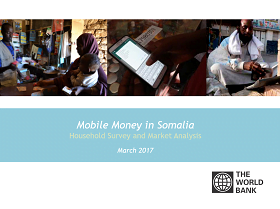
Mobile Money in Somalia – Household Survey and Market Analysis
Report
Key findings from an assessment of mobile money in Somalia. Provides information about mobile money penetration; practicalities; usage; perceptions and the use of shillings versus dollars.
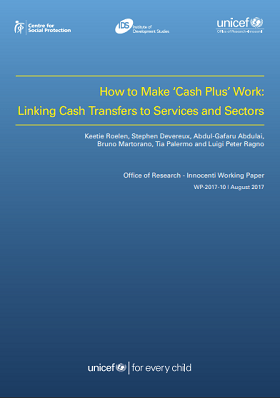
How to Make ‘Cash Plus’ Work: Linking Cash Transfers to Services and Sectors
Report
The broad-ranging benefits of cash transfers are now widely recognized. However, the evidence base highlights that they often fall short in achieving longer-term and second-order impacts related to nutrition, learning outcomes and morbidity.In recognition of these limitations, several ‘cash...

Cash transfer platforms in humanitarian contexts
Report
This report is based on ten days of desk-based research prepared for the Australian Government that aims to respond to the following questions: What is the rationale for using multi-purpose cash transfers and single platforms? What is driving donor agency positions on these issues? What is the evidence...
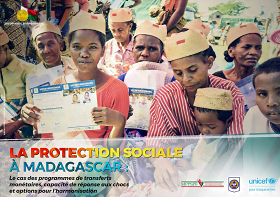
La Protection Sociale à Madagascar – Le Cas des Programmes de Transferts Monétaires: Capacité de réponse aux chocs et options pour l’harmonisation
Rapport
This study was undertaken as commissioned by the Government of Madagascar (Ministry of Population, Social protection and Women’s Promotion and the National Office of Risk and Disaster Management) in coordination with the members of the emergency cash group and with UNICEF’s funding and technical...

Afghanistan Inter-Cluster Cash Post-Distribution Monitoring (PDM) Questions
Guidelines and Tools
Post-Distribution Monitoring questions. Afghanistan 2017

E-transfers Procurement Learning and Good Practices
Guidelines and Tools
Humanitarian agencies have increased their use of cash transfers and related distribution technologies. Yet, most rely largerly procurement and contracting processes designed for goods and professional services. An Elan Survey of humanitarian operations staff and e-transfers providers indicated several...

Responding to Drought in Kenya Using Cash and Vouchers: Learning from Previous Responses
Report
This paper provides a summary of 100 recommendations, lessons and observations from evaluations that have looked at the use of cash and vouchers in drought responses in Kenya. The reports which were reviewed considered the use of cash and vouchers in drought related responses in urban and rural areas;...

From Grand Bargain to Beneficiary: An Analysis of Funding Flows Through the Humanitarian System
Report
The study undertook a financial analysis of a range of projects that received ECHO funding in order to answer the following questions listed in full in the terms of reference (Annex 1): How much donor money (net) gets to the beneficiary? What are the total costs of each stage in the chain? What is...

Enacting urban cash for work programmes in Lebanon in response to the Syrian refugee crisis
Guidelines and Tools
Humanitarian crises in cities require responses that reflect the urban context,address urban challenges, and provide urbanised solutions. This paper focuses on providing guidance on good practice in cash for work (CfW) programmes. Focusing on Lebanon and the Syrian refugee crisis, the paper provides nine...

Shock-Responsive Social Protection Systems Research Case Study: Pakistan
Report
This case study presents an overview of the social protection disaster risk management and humanitarian systems in Pakistan, and discusses both Pakistan’s flagship social protection programme, the Benazir Income Support Programme (BISP), as well as emergency cash transfers provided as disaster...

Learning Event Report: Multipurpose cash and protection for south sudanese refugees in Bidibi refugee settlement Uganda
Report
A consortium of partners comprising DanChurchAid (DCA), Transcultural Psychosocial Organization (TPO) and Mercy Corps (MC) have been implementing an 8-month Cash-based Interventions and Protection (MHPSS) response for South Sudanese refugees in Bidibidi settlement. The response was aimed at addressing...

Cash for Education: A global review of UNHCR programmes in refugee settings
Report
This review provides an overview of the use of cash assistance in 45 cash-related education programmes in 21 UNHCR operations. It highlights the key opportunities and challenges with the use of cash for education and provides key direction for future programming and related protection considerations....

Rapid Market Assessment Sofala Province, Mozambique
Report
The joint TDY between USAID/FFP and FEWS NET Mozambique to Sofala Province, Mozambique had two distinct objectives:
1) Assess current food security and market conditions including:
a) Scale of humanitarian assistance relative to needs
b) Understand maize market structure, conduct and performance
c)...